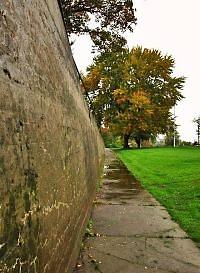|

tidelands
ca.1940s
Albert Renger-Patzsch
_______________________
I Read Because it is Absurd
Birger Vanwesenbeeck
Vanwesenbeeck situates Mark Taylor’s recent Rewiring the Real, within a growing body of critical literature (which also includes John McClure’s Partial Faiths and Amy Hungerford’s Postmodern Belief) that regards religion as key to a robust account of postmodern culture—and for Taylor, in particular, as key to appreciating the novels of William Gaddis, Richard Powers, Mark Danielewski, and Don DeLillo
(....)
Although some literary critics will cringe at the inflation of superlatives in Rewiring the Real or at the at times tiresome regurgitation of critical commonplaces (signifier-signified; uncanny) there is much here that warrants reading and re-reading. The inclusion of The Recognitions —so glaringly absent from McClure’s and Hungerford’s analyses—is a welcome addition to the debate on postmodern religiosity. So is the seemingly counterintuitive theological discourse through which Taylor has opted to approach these works. According to Taylor, what characterizes these novels is the pressing sense that reality is elsewhere, that the machines and technologies that we produce and peruse leave in their wake a form of transcendent longing that can never be fulfilled. The dream of virtual reality in Plowing the Dark; the inability to distinguish copies from originals in The Recognitions; the haunted house that is larger on the inside than it is on the outside in House of Leaves; all of these are examples of how “the real, however it is figured, is always slipping away”.
...(more)
Rewiring the RealIn Conversation with William Gaddis, Richard Powers, Mark Danielewski, and Don DeLillo Mark C. Taylor google books
_______________________

Buchenwald in November
c. 1954
Albert Renger-Patzsch
(1897-1966)
_______________________
The Intrinsic Madness of Consciousness?
By Michael-
Synthetic_zero
(....)
We create synthetic caricatures of experienced realities using symbolic tokens and language to manifest images and narratives about the Real. Thus, we enact a massive, near universally delusion epistemic cognitive detachment from the world with various and mixed results for survival and adaptation. Sometimes we use this detachment to contemplate and imagine and innovate, in other cases we project our fears and nightmares via a multitude of violent acts and collective insanities. At times symbolically achieved sapience has served individuals and collectives well, at other times it drives us off the brink of sustainability and appropriateness.
...(more)
_______________________

Untitled
(School in Aachen)
ca. 1928
Albert Renger-Patzsch
_______________________
Ontological Catastrophe:
Žižek and the Paradoxical Metaphysics of German Idealism
Joseph Carew
full text
Open Humanities Press
This book is an investigation into Slavoj Žižek's return to German Idealism in the wake of Lacanian psychoanalysis. Its thematic crux is Žižek's attempt to develop, by reading the traditions against one another by means of their mutually compatible notions of Todestrieb, a highly original theory of subjectivity able to explain the subject's simultaneous freedom from and dependence upon its material ground. But it does not stop there: rather than just limiting itself to a recapitulation of Žižek's account of the eruptive, ontologically devastating birth of subjectivity out of nature, it also seeks to systematize the stark metaphysical consequences of this account. The fundamental thesis of this book is that, if the emergence of the Symbolic out of the Real—the passage from nature to culture enacted by the founding gesture of subjectivity—is the advent of a completely self-enclosed, self-sustaining structural system, then not only must its founding gesture withdraw from the scene in the very act of instituting the Symbolic, but further, even to explain this act we must posit the absolute as a fragile not-all wrought by negativity and antagonism. Or, to put it in terms of Žižek's Less Than Nothing (his latest magnum opus, or “big fat Hegel book,” as he says), as a series of less than nothings whose essence constitutes an ontologically incomplete field. _______________________

Hamburg, Port c. 1929
Albert Renger-Patzsch
 Avenue du Commandeur
(de la rue d'Alésia)
1877-1878
Charles Marville
(1813 – 1879)
_______________________
Stephen Yablo is the Magilla Gorilla philosophikilla who thinks all the time about ontologies and metaphysics and ontologeses and metametaphysics too, about essentialism, about whether intrinsic is intrinsic to essentialism, about fictionalism and evolving to presuppositionalism, about why conceivability is a guide to possibility, why zembos are harder to get rid of than zombies, about aboutness, about subtraction and about a Wittgenstein thing and other cool stuff. This one is the Ali shuffle thought of via its opposite, only in a mouth
Richard Marshall
about aboutness
Richard Marshall interviews Stephen Yablo 3:am
... one kind of philosopher is curious about what exists and seeks a way of finding out. Another kind, the quizzicalist, thinks that at least some existence-questions are objectively moot. difficult. Moritz Schlick and Susan Stebbing in the 1930s gave “is blue more identical than music?’’ as an example.
Linguists interested in the autonomy of syntax used to dig around for grammatical statements that were nevertheless not interpretable. Chomsky’s “Colorless green ideas sleep furiously” never impressed me that much. I prefer an example that came up a few years ago on the blog Language Log: “More people have been to Germany than I have.” This sounds fine until we try to evaluate it, and realize that a comparison is called for between the number of people who have been to Germany and….what? Amie Thomasson, who is no quizzicalist, suggests “Do Dell computers help you get more out of now?” Quizzicalism is apt to seem unmotivated. Many people would say that they agree either with Carnap that of course there are numbers, since there are primes over ten, or with Quine that it’s a empirical question whose answer depends on whether numbers find a permanent place in the range of our quantifiers.
The funny thing is that Carnap is speaking about a rational reconstruction of English with “framework rules” taking the place of what is actually done by habit. And Quine is talking about a first order regimentation of English. They insist on the reconstruction/regimentation because they themselves can’t make sense of “are there numbers?” as it arises in ordinary English. (Compare also Sider on Ontologese.) Quine and Carnap are really themselves quizzicalists, then, arguably, just like me.
Of course we might differ on whether regimentation allows for a useful successor question to “are there numbers?” And on how curious we propose to be about the answer to that. But that is not the question of quizzicalism as I understand it. One could also rationally reconstruct talk of heaps so that it takes exactly 4 grains of sand to make a heap, or maybe 11. But we don’t believe in a shining, resplendent question of true heapiness waiting that will reveal itself when we clean up our act. That’s how I feel about (some) existence questions.
...(more)
_______________________
Five Poems
Angelo Mao
conjunctions
I.
The knowledge we gathered is no longer useful.
The system you understand shifts and makes no sense.
And this is the body you spent years getting used to.
Tomorrow, the light will not recognize it.
Light has no language for it.
Light has no language for what is smaller than a hairpin turn of a chromatin.
Light must be choked in order to name the smaller things.
My name could change.
We shall say what we shall say and call it knowledge
with this our native speech.
I learned this language to subsist and to compass between myself
and the unknown.
I should not have learned it.
I should have been a fish in a world of rising water, boring
in with immense color until it seems that it was never knowledge
that was gained from the set of things as they are, having been now
turned from by the world
and yet still a knowledge,
a trust that can’t be turned from,
trust in the thing that is an inhabitance of it
of the only thing I am standing on and not
just the dirt slitted with plant roots and leaf stains made up of mashed
chlorophyll pigments, drying up now, pregnant still with incidental light
and nothing to pass it on to
here in the stomach of the beast
punched open to the ceiling lights.
These aren’t our salad days.
(The thing that is understood becoming the thing that is loved.)
(The objective lens made from glass.)
(And the glass melting in due time.)
...(more)
_______________________

Cologne: Bridge
c. 1927
Werner Mantz
(1901-1983)
_______________________
On Ambivalence: A Manifestish
Cole Cohen
entropy
Two-headed feelings each have their own brains, which is the characteristic that differentiates them from two-faced feelings. The condition of two-headedness in feelings is most often caused by a developmental trauma to the nervous system. One feeling is the weaker one, due to malformation or poor development. Neither physicians nor philosophers have discerned if this sensation is one feeling with two heads or two separate feelings sharing one body. The stronger head of the two-headed feeling will eventually attack and attempt to swallow the weaker one. Sometimes fear is the stronger feeling, sometimes desire. The dictionary describes shock as “an encounter between two hostile forces.”
My etymology book explains “terror is stranger than horror but it lasts for a shorter time.” What makes terror stranger than horror? The following symptoms: paralysis, shortness of breath, a panicked racing in the brain. Horror, in contrast, slows time down, washes over you, which is why it lasts longer. Terror is an ice bath, horror is a blood bath.
The word success originally meant result, either good or bad.
Essay is from the French, meaning an attempt; to try.
I am terrified of writing; I am horrified by not writing. Here comes the axe toward the camera, pan out to the blonde in the bathtub.
...(more)
_______________________

Charles Marville
c. 1868
_______________________
Bonnie ‘Prince’ Billy :: The Aquarium Drunkard Interview
(....)
Will Oldham
People don’t experience music totally online. It happens in people’s homes, in exchanges at record stores and shows, and in people’s brains. Our brains are not on the internet – maybe one day they will be, I don’t know — but our lives, our souls, and the music that we experience, the music that people have valuable experiences …the owners of Google might have us believe that everything is on the internet, but it’s amazing how shortsighted and amazingly false that is, especially for a company that claims to have its users welfare at the beginning and end of all its decisions. [Laughs]
There was an owl in my yard, and I have this little dog that’s like seven pounds, and then there’s this huge owl out there I’ve never seen before [with my dog]. The next morning I woke up and was reading an article that had that phrase in it – “Everything is on the internet” – and I thought, “You know, that owl isn’t on the internet.” We’re taught to believe that they are putting more and more things in our cars, in our phones, our computers, and that they are doing us the favor of separating the wheat from the chaff, but really the chaff is online, and the real shit is out here for us to partake in without anybody fucking with us. words.
...(more)
via Spurious

photo - mw
Happy Thanksgiving Day
Canada
_______________________
Deep descent (PoemTalk #81)
Fanny Howe, 'The Descent' & 'The Source'
jacket2
The Source
Fanny Howe
The source
I thought was Arctic
the good Platonic
Up the pole
was soaked film
an electric elevation
onto a fishy platform
and waves on two sides greenly welcoming
The sunwater poured on holy atheism
It was light that powered out
my ego or my heart
before ending with a letter
Fanny Howe at PennSound
_______________________

photo - mw
_______________________
A Hymn
Fanny Howe
(....)
I wonder, will our imagination
remain a temple burning with candles
against all odds?
Behind a nipple and a bone?
The simplest of glands laid in a circle
around skin and liquid
that stirs up imagery
winged and prismed, as if blood
were a wine inducing visions
(....)
* * *
History is more than just another surmising
grandmother at a window
or a reminiscence twisted in the scrim of translation.
Some long-ago light is pulsating in a trout’s heart
on a laboratory dish.
That light has entered all the holes,
no matter how small, because it is the light that wants to live.
* * *
...(more)
_______________________

photo - mw
_______________________
Towards an Ecological Metaphysics
Matthew David Segall
Footnotes 2 Plato
- a response to posts by Leon Niemoczynski and Adam Robbert
(....)
I want to hold out for the possibility of the ecologization of philosophy, rather than suggesting that the present crisis signals the death of philosophy, or its culmination in technoscientific materialism. Many pre-eminent thinkers have argued that philosophy has failed and needs to be replaced with something else (Nietzsche’s transvaluation of all values, the Heideggerian task of thinking Being’s openness, Deleuze’s plane of immanence, Laruelle’s non-philosophy, …). I’d argue otherwise, not so much against the clear genius of these conceptual personae, but against the idea that somehow what they accomplished wasn’t just a renewal of philosophy. Philosophy should be defined by its ability to live the question rather than to solve it, to participate in truth as a quest undertaken in love). Philosophy doesn’t need to be brought to an end by ecology. It can be saved by it, resuscitated, if only it is willing to swallow the speculative pill curing it of the correlationist anthropocentrisms weighing down ancient and modern philosophy alike. If there is to be a future ecozoic civilization, it will require an ecological philosophy. ...(more)

photo - mw
_______________________
Marina Tsvetaeva, 2 Untitled Poems
Translated from the Russian by Ekaterina Rogalsky
I do not think, or argue, or complain.
Or sleep.
I long for neither sun, nor moon, nor sea.
Nor ship.
I do not feel the heat amidst these walls,
Nor garden’s green,
Nor do I long for your desired gift,
Foreseen.
Neither the morning gladdens nor the trolley’s
Ring-singing run.
I live, forgetting date and age
And daylight sun.
I am – a dancer on a tightrope slashed
And hewn.
I am – a shadow’s shadow: lunatic
Of two dark moons.
...(more)
Marina Tsvetaeva: The Dark Princess With White Fingers
Vera Graziadei
_______________________

Cave Paintings in Indonesia Redraw Picture of Earliest Art
via The New Verse News
Confirmed: The Oldest Known Art in the World Is Proto-Graffiti
Megan Garber
World's oldest art found in Indonesian cave
Analysis of images discovered in 1950s counters Eurocentric view of creativity's origins.
David Cyranoski
Nature
_______________________
`Their Importance Is from the Past'
Patrick Kurp
Anecdotal Evidence
As a newspaper reporter, my most happily anticipated interviews were with bartenders, dairy farmers, coin collectors, piano tuners, store-front preachers, nurses and short-order cooks – that is, non-aligned human beings, susceptible to the same vanities as the rest of us but less likely to speak ex cathedra for some authority, real or imagined. I shunned big shots freighted with prestige and anyone else who deemed himself newsworthy. Better reporters than I could deal with the mayor and captains of industry. Give me the people with nothing to sell except, occasionally, themselves.
In “Recollections of the South Sea House,” the first of his Essays of Elia, written when he was forty-five, Charles Lamb betrays a comparable taste for the obscure, unrecognized and forgotten. ...(more)
_______________________
Dust and Exhaustion
The Labor of Media Materialism
Jussi Parikka
ctheory
(....)
This is a text about dust as well as exhaustion: about non-human particles as well as labor. It takes small things like dust as one vector for its argument, and as a vehicle in the manner of which we sometimes think through objects. Dust is, however, not quite an object, not in the intuitive sense that objects are supposed to be easily graspable. It does not fit the hand, even if it covers vast terrains. It is more environmental and better characterized as a milieu. Well, almost a milieu: we rarely count it among things that matter, but what if we did? What if we followed dust as a trajectory for theory -- theory that is concerned with materiality and media? What if dust is one way to do "dirt research": a mode of inquiry that crosses institutions and disciplines, and forces us to think of questions of design as enveloped in a complex ecology of economy, environment, work, and skill. Dirt brings noise, as Ned Rossiter reminds us, and dirt research can be understood "as a transversal mode of knowledge production [that] necessarily encounters conflict of various kinds: geocultural, social, political and epistemological."
(....)
This essay tracks this multiplicity of dust -- multiplicity not only in the sense that there is a lot of it, but in that it forces us to rethink such binaries as One/Many. Dust takes us -- and our thinking -- to different places and opens up multiple agendas. In this case, I use dust to talk of global labor, media materialism of digital culture, and how to approach this topic through such non-human nanoparticles. My argument routes itself through video games to factories, where gadgets are produced, to theoretical excavations in new materialism and speculative philosophy, to science fiction and the engineering of everyday realities. ...
(....)
This is not a text of theory so much as a text about non-humans that persistently concern the human. The non-human refuses to leave the human. This text subscribes to recent arguments that we need to rethink our theoretical perspectives from the point of view of things -- and, I would add, not only things, but also relations and almost-things, stuff that lacks the solidity to merit it being called just a thing.
...(more)
_______________________

photo - mw
_______________________
from “The Desk”
Marina Tsvetaeva
b. October 8, 1892
New Versions from the Russian by Ilya Kaminsky and Jean Valentine
Fair enough: you people have eaten me,
I—wrote you down.
They’ll lay you out on a dinner table,
me—on this desk.
I’ve been happy with little.
There are dishes I’ve never tried.
But you, you people eat slowly, and often;
You eat and eat.
Everything was decided for us
back in the ocean:
Our places of action,
our places of gratitude.
You—with belches, I—with books,
with truffles, you. With pencil, I,
you and your olives, me and my rhyme,
with pickles, you. I, with poems.
At your head—funeral candles
like thick-legged asparagus:
your road out of this world
a dessert table’s striped cloth.
They will smoke Havana cigars
on your left side and your right;
your body will be dressed
in the best Dutch linen.
And—not to waste such expensive cloth,
they will shake you out,
along with the crumbs and bits of food,
into the hole, the grave.
You—stuffed capon, I—pigeon.
Gunpowder, your soul, at the autopsy.
And I will be laid out bare
with only two wings to cover me.
Late July 1933
The Best of Marina Tsvetayeva
translated by Ilya Shambat
Twenty-Four Poems
Marina Tsvetaeva
Translated by A. S. Kline

photo - mw
_______________________
Minimal Ethics for the Anthropocene
Joanna Zylinska
Open Humanities Press
An
(....)
This unique situation, or rather geo-historical period, in which humans are said to have become the biggest threat to life on earth, has recently gained the moniker “Anthropocene”. Emmott’s practical solution to this situation is rather blunt: given that any possible technological or behavioral solutions to the current state of events, even if theoretically possible, are unlikely to work, the advice he would give his son would be to “buy a gun”. This is of course a powerful story, the goal of which is to shock and awe us into action. Without shooting our gun-wielding messenger, it is worth pointing out that there seems to be something both defeatist and narcissistic about jeremiads of this kind and those that tell them. Also, we humans have actually produced narratives about different forms of apocalypse ever since we developed the ability to tell stories and record them.
Rather than add to this catalogue, my aim in this book is to tell a different story about the world and our human positioning in and with it, while taking seriously what science has to say about life and death. I am mindful of philosopher John Gray’s admonition in his review of Emmott’s book that “The planet does not care about the stories that humans tell themselves; it responds to what humans do, and is changing irreversibly as a result”. Gray is no doubt correct in his skepticism. Yet it should be noted that we humans do care about the stories we tell ourselves. More importantly, stories have a performative nature: they can enact and not just describe things—even if there are of course limits to what they are capable of enacting. This book is one such story about life and death at both macro and micro scales, shaped into a set of philosophical propositions for non-philosophers. More specifically, its aim is to outline a viable position on ethics as a way of living a good life when life itself is declared to be under a unique threat. In other words, it is a story about how we can live a good life at this precarious geo-historical moment—and about what constitutes such goodness.
(....)
via
_______________________
how does speculative naturalism and bleak theology relate to the new metaphysics?
Leon Niemoczynski
(....)
... speculative naturalism and bleak theology (how I describe my own current philosophical projects) draws from the American philosophical tradition as much as it does the Continental philosophical tradition.
The key ideas for both traditions, I think, when it comes to developing an environmental philosophy that is inspired by recent positions of speculative philosophy in realist and materialist orientation, is that these metaphysical positions are developed so that they are thoroughly ecological. Thus, "speculative naturalism" is an ecological metaphysics as much as it is a realist and materialist metaphysics.
...(more)
_______________________
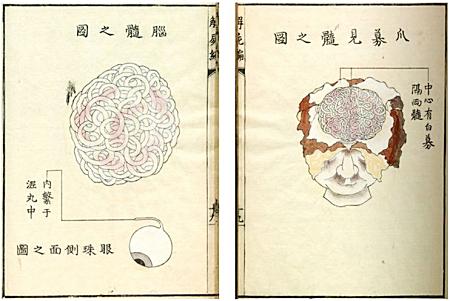
this is your brain on paper
Isabelle Moffat
Images from the history of an organ:
medieval diagrams, Japanese woodcuts, digital scans.
triplecanopy
_______________________
The new romantics: Authenticity, participation and the aesthetics of piracy
Margie Borschke
Abstract
The participatory, collaborative and open character of networked digital media is thought to disrupt and challenge romantic assumptions and ideals about authorship, authenticity and creative expression, concepts that underpin most copyright regimes. In this article I consider MP3 blogs in the mid-2000s, drawing on an earlier study of MP3 bloggers in the U.S. and U.K. (Borschke 2012a, 2012b). MP3 blogs, like Napster and other forms of unauthorized reproduction, are better understood as cultural practices and artifacts when considered alongside piracy’s long history. The aesthetic consequences and possibilities of forms of expression that are also methods of distribution, are clarified by identifying and examining a tension that connects MP3 blogging to other practices of unauthorized use: that is, the persistence of romantic ideals of creativity, authenticity and authorship even while seeming to deny and disregard them. By acknowledging the poetics of piracy practices (including the aesthetic character of distribution and replication) we can begin to understand how new authenticities build up around networked expression and how the meaning of networked forms of expression, formats, practices and artifacts can change over time.
Special issue — Napster, 15 years on: Rethinking digital music distributionFirst Monday
_______________________

photo - mw
_______________________
Paean to Place
Lorine Niedecker
(....)
I grew in green
slide and slant
of shore and shade
Child-time—wade
thru weeds
Maples to swing from
Pewee-glissando
sublime
slime-
song
Grew riding the river
Books
at home-pier
Shelley could steer
as he read
I was the solitary plover
a pencil
for a wing-bone
From the secret notes
I must tilt
upon the pressure
execute and adjust
In us sea-air rhythm
“We live by the urgent wave
of the verse”
...(more)
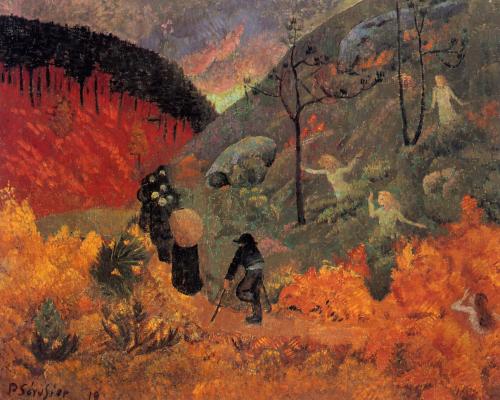
Les Heures
1919
Paul Sérusier
d. October 7, 1927
_______________________
Corner
Sebastian Agudelo
Harvard Review Online
(....)
What does Coetzee say? In a time out of time,
at either side of the divide you’ve got children
of paradise, fresh off swimming lesson, riding, ballet,
soft as putti, shining with angelic light, fenced in.
Their innocence, the innocence of grubs,
bliss-filled, soul-stunned, abstracted, plump.
Like the lumpish, spoilt bullies in the last row,
they’ll be promoted and rule the land.
Legitimacy they no longer trouble to claim, he says.
And then, their cousins on whom the first shade
of the prison house is already beginning to close,
rapacious, cruel, afraid of nothing, children of iron
of the times, snarled in the knags of violence.
...(more)
via
_______________________
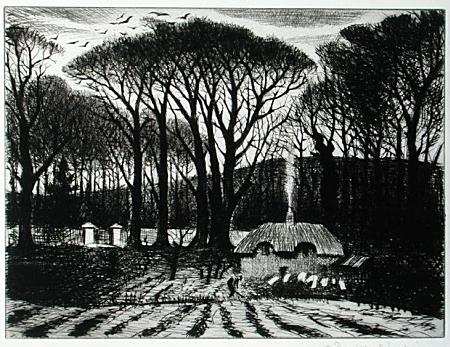
The Manor Gates
Christopher Richard Wynne Nevinson
d. October 7, 1946
_______________________
Candide’s Garden: A Parable
Helen DeWitt
dissent
Candide, after many vicissitudes, retreats to a primitive cabin in the woods; he will cultivate his garden. He drinks, smokes too much. He goes to AA, an avowedly apolitical social machine for sobriety. At each meeting one volunteer reads the Twelve Traditions, a second the Twelve Steps, each member speaks briefly in turn (cross-talk forbidden), the serenity prayer is recited in unison. God, grant me the serenity to accept the things I cannot change, courage to change the things I can, and wisdom to know the difference.
The Twelve Traditions forbid political or commercial affiliation, alteration to the Traditions, Steps, much more apparently written in stone. The beginner is told to attend 90 meetings in 90 days. Surely unemployment is highly correlated with alcoholism? Might political action not be a remedy? Can solidarity not sometimes bring about change unachievable by individuals? How can changing the very mechanisms for change be off-limits?
After a meeting Candide meets 5 former smokers, each of whom says: Well, one day I just realized it was stupid and stopped. Candide wants to apostrophize the world. Alcoholics who did the same thing don’t turn up for 90 meetings in 90 days; those who do turn up don’t hear from those who don’t; how can members know what they can change when they are forced to cherrypick evidence? Il meurt de ses ennuis.
But there’s always his garden. ...(more)
Dissent: Fall 2014
_______________________
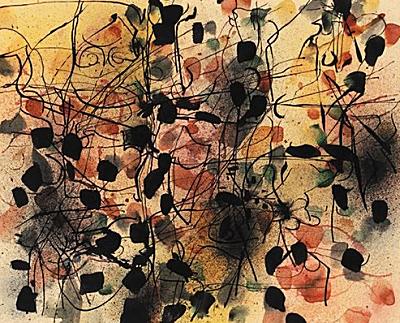
1955
Jean-Paul Riopelle
b. October 7, 1923
_______________________
Chris Lebron is a philosopher who asks deep questions about theories of justice appropriate for race. He thinks about bridging the gap between abstraction and lived experiences, about American democracy and racial inequality, marginalisation and oppression, about the idea of character and how it helps explain racial inequality, about the problem of social value, about why Rawls isn't enough, about 'white power', about despair and blame, about perfectionism and egalitarianism, about soulcraft politics, about three principles of racial justice and about the lamentable number of black philosophers currently working in the Academy. Give this one the time of day to sink in, then reboot …
Richard Marshall
the colour of our shame
Chris Lebron interviewed by Richard Marshall.
(....)
America is a liberal democracy that, despite that description and despite the passage of the Civil Rights Act of 1964, continues to be a functioning and quite vibrant site not only of common indicators of racial inequality (income, wealth, resources, employment) but of racial marginalization (segregation, the reproduction of disparaging racial stereotypes in our popular media) as well as racial oppression (disproportionate jailing and the devaluation of black life by the institutions of criminal justice whether it be by disproportionate application of the death penalty or unpunished acts of violence against blacks by police). So we have to ask ourselves: just what kind of ‘liberal democracy’ is marked by a strain of deep and disrespectful injustice that is contrary to the very idea of liberal democracy? My answer is: One that doesn’t merely marginalize but one that explicitly and implicitly rejects the humanity of black Americans. So it is more than not being part of American society. It is deeper. It is not being seen fully as the kind of thing that can vie for membership in American society – a human being. So here, the question of loneliness is not itself as central as the diminished value of black humanity.
I noted the slippage between the standards and principles entailed by the form of governance we describe as liberal democracy on the one hand, while on the other, the consistent demeaning and unjust treatment of black Americans. The very notion of slippage between the principles to which we subscribe and the reasoning, attitudes, and actions we take up provides the grounds for shame. That we might or ought to feel shame in any instance is not in itself in the ordinary course of things always a reason to raise questions of justice. When as a parent we affirm the virtue of generosity towards our children but act meanly on an occasion, this seems appropriately remedied by a genuine apology and show of affection. So the question here is, what, for me, raises the question of justice in the case under consideration – racial inequality? This is the role I set for character.
...(more)
_______________________
#Accelerate in reverse
McKenzie Wark
Public Seminar Commons
There is a general tendency to take the current moment of more-or-less openly acknowledged slow-motion crisis as an excuse to double-down on very old fashioned modes of thinking.
The most common form of this reactionary response is religious fundamentalism, with its denial of science and insistence on scripture. A rather more high-minded version of exactly the same thing is philosophical fundamentalism, with its rather comic attempt to think the world through the repetition of the reading of its own canon of scriptures.
_______________________
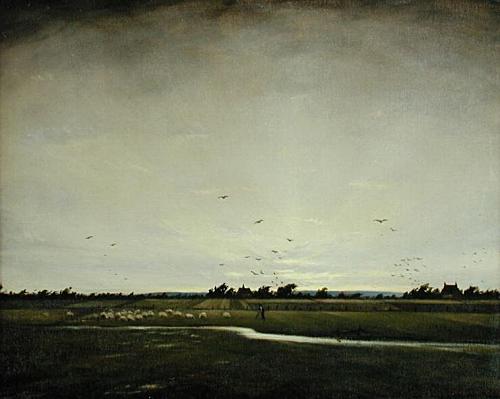
Romney Marsh
Christopher Richard Wynne Nevinson
_______________________
New Writing from Syria
The Liberated Voice: Three Writers from Syria
Alice Guthrie
words without borders
Clearly the most important duty for the outsider looking to read new Syrian literature at the moment is not to expect a consistent voice or search for a monolithic take on the current period of Syrian history—or on anything else, for that matter. As a translator of Arabic literature and a sometime resident of Damascus with many Syrian friends, perhaps the most depressing question one gets asked is “What do Syrians / Syrian women / Arabs / young Arabs / ordinary Arabs think about X?” So far there’s no tattoo on my forehead of the phrase “'They' Are as Diverse as ‘We’ Are,” but it could yet come to that.
One way for us translators to keep our faces uninked is to keep translating as broad an array of Syrian voices as possible and getting people to read them: hence the little selection of contemporary Syrian work I’ve chosen here. These writers are all asking and answering different questions, in different ways, as individuals, like any other artist working anywhere; their work is moving and important and challenging for a whole range of reasons and in a whole range of ways, without representing anyone else or any particular demographic.
Having said that, of course their work—and their commentary on it—is deeply entangled with the extreme politics of the context in which they’ve grown up and lived, and as such has much to teach us about the specific horrors and joys of that reality. Just don’t expect the nature of that teaching to be neat, categorized, obvious, or even necessarily noticeable to you as the reader. This little snippet of three Syrian voices should be read as the tattoo about individuality, not as any sort of cross-section or comprehensive guide to the (dreaded) “authentic Syrian voice.”
...(more)
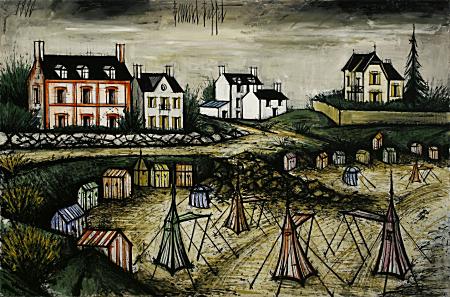
La plage des Callots
Bernard Buffet
d. October 4, 1999
_______________________
End of Summer
Stanley Kunitz
1905 - 2006
An agitation of the air,
A perturbation of the light
Admonished me the unloved year
Would turn on its hinge that night.
I stood in the disenchanted field
Amid the stubble and the stones,
Amazed, while a small worm lisped to me
The song of my marrow-bones.
Blue poured into summer blue,
A hawk broke from his cloudless tower,
the roof of the silo blazed, and I knew
that part of my life was over.
Already the iron door of the north
Clangs open: birds, leaves, snows
Order their population forth,
And a cruel wind blows.
_______________________
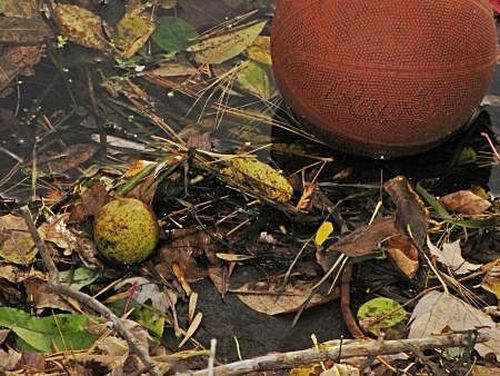
photo - mw
_______________________
The Monument
Elizabeth Bishop
d. October 6, 1979
(....)
It is an artifact
of wood. Wood holds together better
than sea or cloud or sand could by itself,
much better than real sea or sand or cloud.
It chose that way to grow and not to move.
The monument's an object, yet those decorations,
carelessly nailed, looking like nothing at all,
give it away as having life, and wishing;
wanting to be a monument, to cherish something.
The crudest scroll-work says "commemorate,"
while once each day the light goes around it
like a prowling animal,
or the rain falls on it, or the wind blows into it.
It may be solid, may be hollow.
The bones of the artist-prince may be inside
or far away on even drier soil.
But roughly but adequately it can shelter
what is within (which after all
cannot have been intended to be seen).
It is the beginning of a painting,
a piece of sculpture, or poem, or monument,
and all of wood. Watch it closely.
_______________________

photo - mw
_______________________
Windows
Linda Bierds
When the cow died by the green sapling,
her limp udder splayed on the grass
like something from the sea, we offered
our words in their low calibrations—
which was our fashion—then severed
her horns with a pug-toothed blade
and pounded them out to an amber
transparency, two sheets that became,
in their moth-wing haze, our parlor windows.
They softened our guests with the gauze-light
of the Scriptures, and rendered to us,
on our merriest days, the sensation
of gazing through the feet of a gander.
In time we moved up to the status
of glass—one pane, then two—each
cupping in proof of its purity
a dimple of fault, a form of distortion
enhancing our image. We took the panes
with us from cottage to cottage,
moth-horn and glass, and wedged up
the misfitted gaps with a poultice
of gunny and wax. ...(more)
_______________________
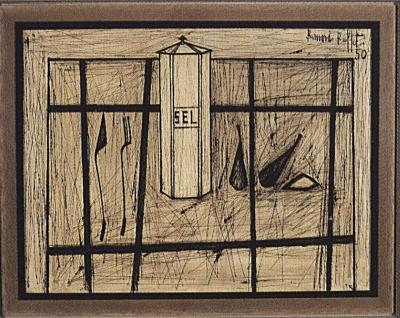 salt cellar
Bernard Buffet
_______________________
Conversation strives toward silence, and the listener is really the silent partner. The speaker receives meaning from him; the silent one is the unappropriated source of meaning. The conversation raises words to his lips as do vessels, jugs. The speaker immerses the memory of his strength in words and seeks forms in which the listener can reveal himself. For the speaker speaks in order to let himself be converted. He understands the listener despite the flow of his own speech; he realizes that he is addressing someone whose features are inexhaustibly earnest and good, whereas he, the speaker, blasphemes against language.
But even if he revives an empty past through orgiastic excitement, the listener hears not words but the silence of the present. For despite the flight of spirit and the emptiness of words, the speaker is present; his face is open to the listener, and the efforts made by his lips are visible. The listener holds true language in readiness; the words enter him, and at the same time he sees the speaker.
Whoever speaks enters the listener. Silence, then, is born from the conversation. Every great man has only one conversation, at whose margins a silent greatness waits. In the silence, energy was renewed; the listener led the conversation to the edge of language, and the speaker creates the silence of a new language, he, its first auditor.
Silence is the internal frontier of conversation..............
The Metaphysics of Youth
Walter Benjamin
Selected Writings Vol.1, 1913-1926
Ed. Marcus Bullock, Michael W. Jennings
google books
_______________________

Nature Morte Au Hibou
Bernard Buffet
_______________________
Textual Communities: Nancy, Blanchot, Derrida.
Kuisma Korhonen
Culture Machine, Vol 8 (2006)
VI
From the reader's point of view, nothing in the text itself reveals whether the one who once wrote it is dead or alive. By writing, we inscribe ourselves into a sphere where the living and the dead are co-equal; moreover, according to a long tradition, reading is a conversation with the dead. We may even claim, like Jean Genet once did, that not only can we read sentences that are written by dead authors ' by writing we move, in a way, already into a world where we can respond to the voices of the dead. Or, perhaps, the very fact that we cannot answer in this life to those who are on the other side renders the twofold imperative of responsibility ' to carry responsibility for the other and to respond to the other ' even more urgent and calls us to imagine another world, a fictive world where communication has no limits, and where other minds become transparent to the eyes of the narrator.
As writers, we join the dead. As soon as we have written our words down, they cease to be ours, they become words of someone who is no longer here, who has already crossed the line and moved to the other side. In writing, we face the past ' my past, our past, and the past of those who I never knew. Part of the author's responsibility is to answer also for those who did not write, who did not leave documents or other official traces; who, in the maelstroms of history, were marginalized, silenced or killed. It is part of the author's responsibility to listen to how the wind cries and how the stones weep for those who are no longer here, not even as traces. And perhaps for those, too, who have never been alive.
The text itself does not necessarily reveal whether the characters that are represented in it have ever been real or not. Of course, there are textual conventions that suggest that the text is meant to be read as fiction; and we do necessarily hold some previous knowledge of the world that suggests to us whether it is probable that these kind of events can take place in our real world or not. But as Hayden White has argued, the techniques of description, figuration and emplotment are not so different in fiction and non-fiction as we would like to believe. Or, as Ricouer put it, history consists of more or less fictionalized narratives of the past, whereas fiction is more or less historicized imagination.
We may also claim that literature challenges the limits between human and non-human communities. Fiction (such as myths) may take us to the world of animals and help us to imagine other kinds of living forms. By reading, we are already confronting something that is necessarily on the limits of the living presence of other humans: language as such is both the living energy of living human beings and more or less inhuman structures that can be stored, reproduced and even generated by machines. What we ultimately encounter in literature is not the author (the author is, by definition, no longer present) or the world full of different beings (they are, after all, only textual constructions, although we cannot help but imagine some kind of existence for them in our reading experience), but the very materiality of language, the 'il y a' or the 'murmur of the world' (Lingis, 1994), the white noise of being that we hear when all meanings have been stripped from words.
Textual communities are thus communities that are capable of transgressing limits between life and death, existence and non-existence. Textual communities are formed by the living, the dead, the human, the non-human and imaginary beings.
...(more)
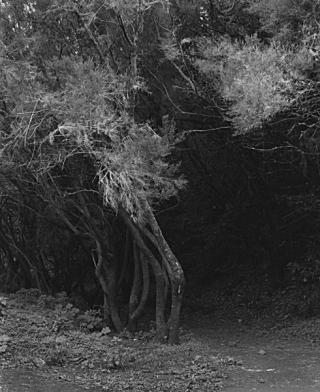
Awoiska van der Molen via
_______________________
Continual Conversation With A Silent Man
Wallace Stevens
b. October 2, 1879
The old brown hen and the old blue sky,
Between the two we live and die--
The broken cartwheel on the hill.
As if, in the presence of the sea,
We dried our nets and mended sail
And talked of never-ending things,
Of the never-ending storm of will,
One will and many wills, and the wind,
Of many meanings in the leaves,
Brought down to one below the eaves,
Link, of that tempest, to the farm,
The chain of the turquoise hen and sky
And the wheel that broke as the cart went by.
It is not a voice that is under the eaves.
It is not speech, the sound we hear
In this conversation, but the sound
Of things and their motion: the other man,
A turquoise monster moving round.
_______________________
Melville’s Emerson
John Latta
(....)
Too, there’s Melville’s reply to Emerson’s lovely trope—
Language is fossil poetry. As the limestone of the continent consists of infinite masses of the shells of animalcules, so language is made up of images, or tropes, which now, in their secondary use, have long ceased to remind us of their poetic origin. But the poet names the thing because he sees it, or comes one step nearer to it than any other.
Melville, writing across the bottoms of two pages and up the margin of another:
This is admirable, as many other
thoughts of Mr. Emerson’s are. His gross
and astonishing errors & illusions
spring from a self-conceit so
intensely intellectual and calm that at
first one hesitates to call it by its right
name. Another species of Mr Emerson’s
errors, or rather, blindness, proceeds from a defect in
the region of the heart.
...(more)
_______________________
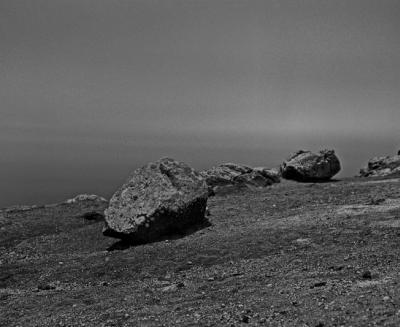
Awoiska van der Molen
_______________________
Bonfire of the humanities
Public debate is afflicted by short-term thinking – how did history abdicate its role of inspiring the longer view?
David Armitage and Jo Guldi
aeon
(....)
The opportunity to array the longue durée against endemic short-termism has arrived with a vengeance. The most pressing problems of our time – for example, climate change, crises of global governance, the proliferation of inequality – have no simple solutions because they have such deep roots. But disentangling is what historians do. We are trained to balance different forms of data against each other, to be alert to the complexity of causality, to consider how long-term structures interact with short-term determinants. Where other social scientists value parsimony – the most stripped-down, cleanest explanation or analysis of a problem – historians prefer profligacy, a multiplicity of sources against which to calibrate causation and to foresee the conflicted futures arising from multiple contested pasts.
Many adjacent human sciences, and even the natural sciences, have undertaken a historical turn of late. The era of big data is an age of proliferating evidence about the human and non-human past: statistical, verbal and physical, from massive verbal corpora of digitised texts, via tweets and climate data, to ice-cores, tree-ring data and the human genome. Some of our colleagues are even deploying the longue durée to undermine some of the most cherished illusions of their disciplines.
...(more)
_______________________

photo - mw
_______________________
Beauty is momentary in the mind —
The fitful tracing of a portal;
But in the flesh it is immortal.
Wallace Stevens, Peter Quince at the Clavier
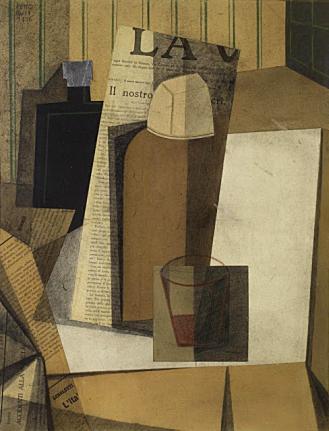
La Voce (The Voice)
1916
Emilio Pettoruti
b. October 1, 1892
_______________________
I is a foreigner
Erin Moure
jacket2
Eu son unha forasteira, sempre unha forasteira. I am a foreigner, always foreign. Loito nunha escuridade funxk,bel con toda outra escuridade. I struggle in a fungible and obscure darkness alongside every other kind of obscurity. Son unha forasteira con historia, con historias multiples, historias que nunca vivk,n. I am a foreigner with a history, with multiple histories, histories I never lived. Historias xenéticas, de xenética. Genetic histories, of genetics. Sempre sei que idioma uso. I always know what language I speak in. Imaxino sen imaxes, senón con temperaturas e luz e vagaridades que me pican no pel. I imagine without images, but with temperatures and light and wanderings that prickle and disturb my skin. Indescriptk,beis. Indescriptible. Postures with furniture. And I age, I am aging. Limits of the body and mind.
And the text. It is here before me, in front of me, the text. É e esti;. It is in itself, and it is sited in time/space. And me, awake. With coffee. Without glasses. Light. The form of the letters in front of me....(more)
“Funnily, the ones most likely to accept a notion of transparent transference between languages are those who are monolingual. And who thus must translate everything under very difficult circumstances: without any language of origin. To have a language of origin you need a language of arrival: without at least two languages, neither exists. There is just, ever, language. In such case, there is just, ever, one culture so absorbed in its structures that any one individual speaker cannot question and challenge many of its assumptions.”
- Erin Moure
Poetries, languages and selves, the being of Erin Moure
Sina Queyras
(....)
Moure’s work dwells in the possible. In the changeable. It’s “being” in poetry. It’s also thinking in poetry. Even as I write this I can hear Erin Mouré interacting with my text: referring me to Deleuze, Char, Butler, joyfully expanding my thoughts on her work, correcting certain assumptions. In fact, every time I attempt to describe her work she shifts uncomfortably, albeit good naturedly, translating me into Galician, French even Mouré…the poem is never what you think it is, she says, “Human struggle is always sited in human bodies. Not in bodies as signifiers, but bodies as lived apparatuses”. The bodies of poems sit up and take notice. Each time they move they refresh themselves, “they recuperate but do not solve” ...(more)
Erin Moure at EPC and House of Anansi
_______________________
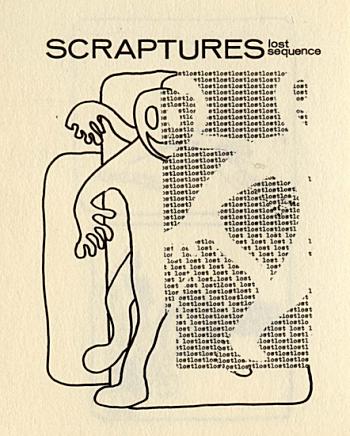
bpNichol
b. September 30, 1944
_______________________
Poem Without Ends
Alastair Reid
(1926 - 2014)
One cannot take the beginning out of the air
saying 'It is the time: the hour is here'.
The process is continuous as wind,
the bird observed, not rising, but in flight,
unrealised, in motion of the mind.
The end of everything is similar, never
actually happening, but always over.
The agony, the bent head, only tell
that already in the heart the innocent evening
is thick with the ferment of farewell.
_______________________

Lucien Lévy-Dhurmer
b. September 30, 1865
_______________________
Where Truth Lies
Alastair Reid
Maps, once made,
leave the impression of a place gone dead.
Words, once said,
anchor the fevers in the head.
Vows, once taken,
fade in the shadows of a place forsaken.
Oh, understand
how the mind's landscape forms from shifting sand,
how where we are
is partly solid ground, part head-in-air,
a twilit zone
where changing flesh and changeless ghost are one,
and what is true
lies between you and the idea of you -
a friction,
restless, between the fact and the fiction.
_______________________
Dannie Abse
1923–2014
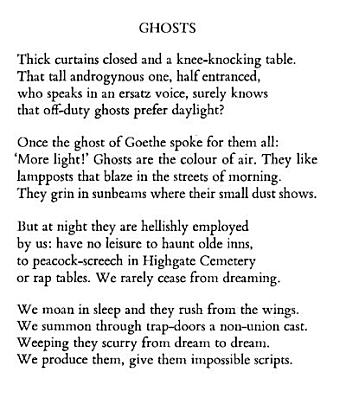
_______________________
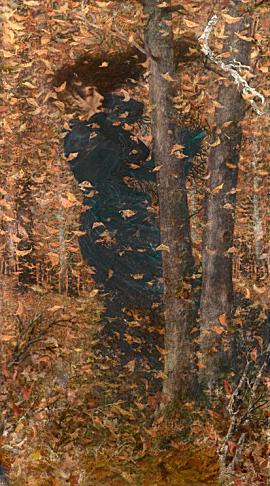
Lucien Lévy-Dhurmer
_______________________
Paul Crowther bites the hands of both analytic and continental philosophical approaches to aesthetics. Whilst chewing he thinks about how post-modernism is linked to market forces and Supermodernity, about how civilising is organised round self restraint, about how Derrida, Foucault, Lacan, Deleuze have created a distorting orthodoxy, about rejecting analytic philosophical approaches to art, about White Aesthetics, about post-analytic phenomenology, about phenomenological depth, about subject-object reciprocity, about meaning in abstract art, about Kant and German Idealism. Take this one neat and then go for a walk…
- Richard Marshall
post-analytic phenomenology vs market serfdom
Paul Crowther interviewed by Richard Marshall.
(....)
The challenge to the realm of values presented by Supermodernity is colossal. As embodied beings, we exist in a world – both natural and cultural – that is rich, diverse, complex, and full of different aspects. However, Supermodernity violates this complexity. It is permeated by the cult of management that seeks to promote ‘efficiency’ by reducing everything to models of social interaction and outcomes derived from cybernetics and the advertising industry. What it is to be human, and what it is to change oneself and be encultured in a deep sense is lost. Indeed, the very notion of freedom itself is reduced to consumer choices. Of course, there has always been a difficult relation between money and civilization, but in most eras there was always a strong sense that some things were more important than money-power. Values of a moral and aesthetic nature, and such things as self-development and bettering oneself and one’s community, were acknowledged as things that had to be protected from market forces. This critical distance has been lost. And the intellectual relativisms of Supermodernity are not the slightest help in reconfiguring it, because they are complicit in the new market serfdom.
...(more)
_______________________
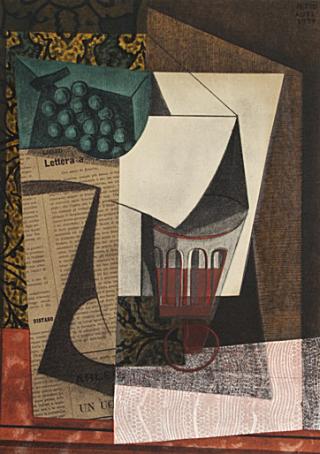
Emilio Pettoruti
|
